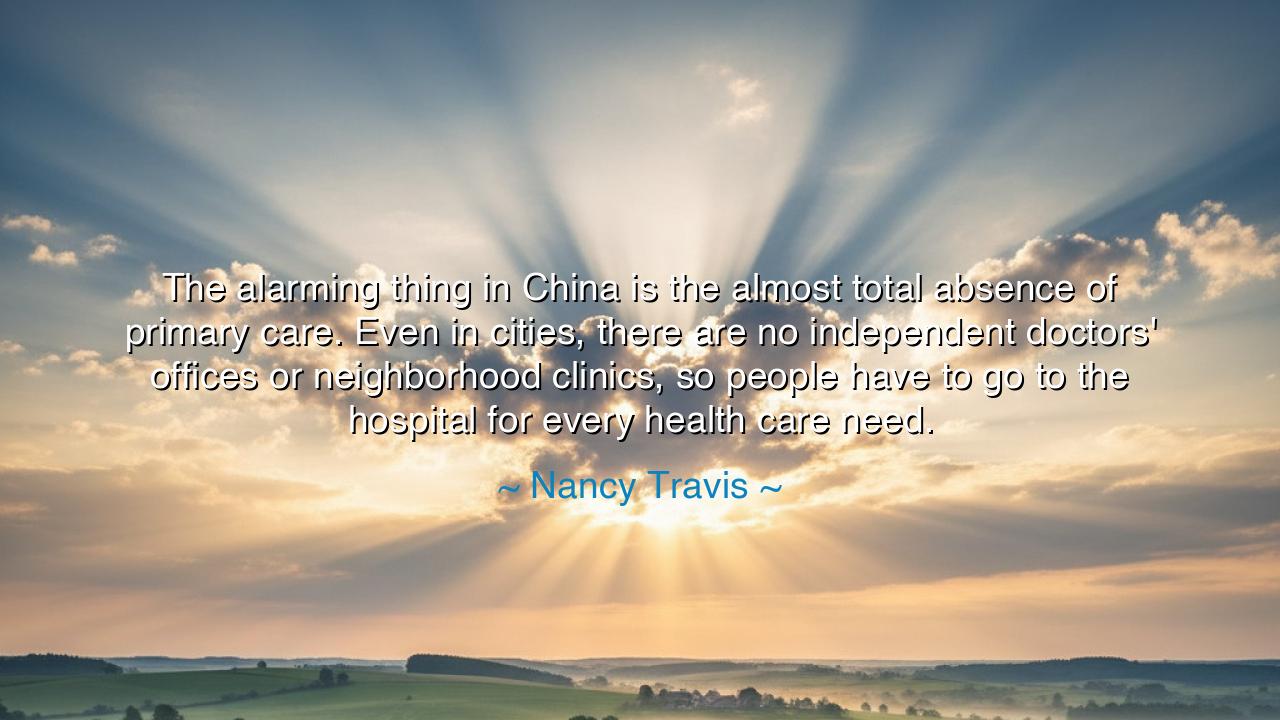
The alarming thing in China is the almost total absence of
The alarming thing in China is the almost total absence of primary care. Even in cities, there are no independent doctors' offices or neighborhood clinics, so people have to go to the hospital for every health care need.






“The alarming thing in China is the almost total absence of primary care. Even in cities, there are no independent doctors' offices or neighborhood clinics, so people have to go to the hospital for every health care need.” – Nancy Travis
In this reflection, Nancy Travis speaks not only of China’s system of healing but of a truth that echoes through all civilizations: when the bond between people and their healers is broken, the body of society itself grows ill. Her words reveal a deep sorrow — the absence of primary care, of humble clinics and familiar physicians, of those small sanctuaries where human hands once met human suffering with compassion and constancy. For when medicine becomes distant, when care is confined to grand institutions and stripped of personal connection, a nation’s heart grows weary, no matter how advanced its hospitals or how vast its cities.
The ancients understood this sacred bond between healer and community. In old China, the village doctor was not merely a technician of the body; he was a keeper of harmony, a watcher of balance between wind and blood, between man and nature. He knew his people — their faces, their families, their fears. When illness came, he treated not the symptom alone, but the story behind it. He was the quiet guardian of health long before disease could take root. But in the rush of modernity, this ancient wisdom has faded like incense smoke in the wind. Hospitals rise like palaces, yet the gentle art of personal care wanes, and the people must travel far even for a fever or a child’s cough.
Consider the story of Dr. Sun Yatsen, who was both physician and revolutionary. Before he became the “Father of Modern China,” he was a village healer, moving from home to home, tending to the poor who could not afford the hospitals of the empire. He once wrote that “medicine is the foundation of civilization,” for without health, neither freedom nor knowledge can thrive. Sun understood what Travis laments: that primary care — the healer among the people — is the root from which all greater systems grow. Without it, even the grandest hospitals become overwhelmed, like rivers clogged at their source.
Yet this truth reaches far beyond China. Across the earth, in many lands, the same imbalance grows. Cities glitter with technology, but compassion is rationed. Patients become numbers, physicians become administrators, and healing becomes transaction. The hospital, once a refuge for the gravely ill, now bears the weight of the ordinary and the preventable. The system grows heavier, colder — and the human heart, both of doctor and patient, grows distant. For medicine, stripped of familiarity, becomes machinery.
But wisdom whispers that the cure is not found in more towers of glass or machines of steel, but in the return to community — in the rediscovery of the neighborhood clinic, the local healer, the trusted physician who walks among his people. The body of a nation, like that of a man, thrives when its smallest parts are nourished. Just as the capillaries feed the heart, so must the small clinics sustain the great hospitals. To neglect them is to let the lifeblood of care grow thin.
Let us imagine a world where every person, rich or poor, could walk down the street and find a healer who knows their name — where a mother could bring her child not to a crowded hospital hall but to a clinic lit with warmth, where the doctor remembers the child’s laughter and the family’s history. Such a world would not only heal sickness but restore trust, that most sacred bond between the sufferer and the one who serves. For the foundation of medicine is not technology, but relationship; not profit, but presence.
The lesson, then, is clear: health begins close to home. A society that forgets this truth risks not only disease of the body but also of the spirit. Let every nation remember the wisdom of the ancients — that healing begins not in palaces of science, but in the humble hands of those who dwell among us. If we would strengthen our people, we must build care that is near, personal, and enduring. For when the healer walks again among the people, the people will walk again in health.
So, O seeker of wisdom, let this teaching settle deep within you: build small before you build great, nurture the roots before you reach for the heavens, and remember that true care is not measured in walls or wealth, but in the closeness of hearts. Only then shall the body of humanity be well again.






AAdministratorAdministrator
Welcome, honored guests. Please leave a comment, we will respond soon